For those of you who track island life, you’ll likely know there are 15 year-round, unbridged islands along the Maine coast. Distinguished by their differences more than their commonalities, these islands span the coast from Cliff Island, the smallest of the Casco Bay islands, to Matinicus, the most distant island located 20 miles off the coast of Owls Head, and Swan’s Island, off the coast of Mount Desert Island with its unofficial motto, “Six miles east of ordinary.”
These islands—the “famous 15”—are notable because they support communities, provide jobs, have deep fishing and family traditions, and are well-known tourist destinations.
These 15 islands are a tiny portion, however, of the more than 4,000 bridged, privately owned, and uninhabited islands that dot the Maine coast. Some are home to committed seasonal communities—quiet in the winter but hives of activity in the summer—while others are uninhabited wildlands and wetlands with allure for boaters, kayakers, and adventurers.
Importantly, many of these wild islands are sites for world class scientific research at the intersection of a changing Gulf of Maine and our local ecological systems.
Islands are the sentinels, the canaries in the coal mine, and offer us a chance to address the earliest impacts of coastal climate change.
On their own, each Maine island represents a unique opportunity to understand and celebrate the Maine coast from a different natural vista, through the eyes of a well-established community, or from a working waterfront that connects Maine’s iconic lobsters to the rest of the world.
Together this collective composes a vast frontier between the mainland and the larger ocean ecosystem. Like islands around the world, Maine’s islands are on the frontlines of climate change. Islands are the sentinels, the canaries in the coal mine, and offer us a chance to address the earliest impacts of coastal climate change.
Islands on the frontline of climate change is not a new concept. Most of us are keenly aware of the particularly acute challenges facing small island nations that have banded together as the Small Island Developing States. It’s not only sea level rise, the intensity of storms, and coastal erosion that are at the center of their concerns. The impact of climate change on health and the viability of marine species is increasingly evident and has a direct impact on livelihoods and lives.
Here in Maine, Island Institute is anticipating and preparing for these challenges in several ways, working directly with island communities, building local capacity through our Island Institute Fellows Program, translating climate science into actionable information for communities, and exploring cutting edge ways to reduce coastal carbon emissions.
Our partnership with the Governor’s Office for Policy Innovation and the Future is designed to help communities develop their own priorities and plans to address climate change.
To date, we’ve worked with nine island committees to engage community members in assessing their climate risks and priorities. In my own hometown of Chebeague Island, this partnership with Island Institute led to the formation of our town’s climate action team.
Increasingly, we’re seeing Island Institute Fellows placed in communities that need an extra set of hands advancing their climate action plans.
Bri Cunliffe, a Bowdoin graduate, is one of our current Fellows who has been placed on Mount Desert Island to support its “A Climate to Thrive” initiative. Using her community development skills and training from Island Institute, Bri is helping the MDI community move toward clean, reliable energy.
In each of these examples, community members are leading the approach because they are closest to the challenges, and they are best placed to read and hear the signs in their own communities. They know that Maine islands have a lot to teach us, if we take the time to look and listen carefully.
Kim Hamilton is president of Island Institute, publisher of The Working Waterfront. She may be contacted at khamilton@islandinstitute.org.





